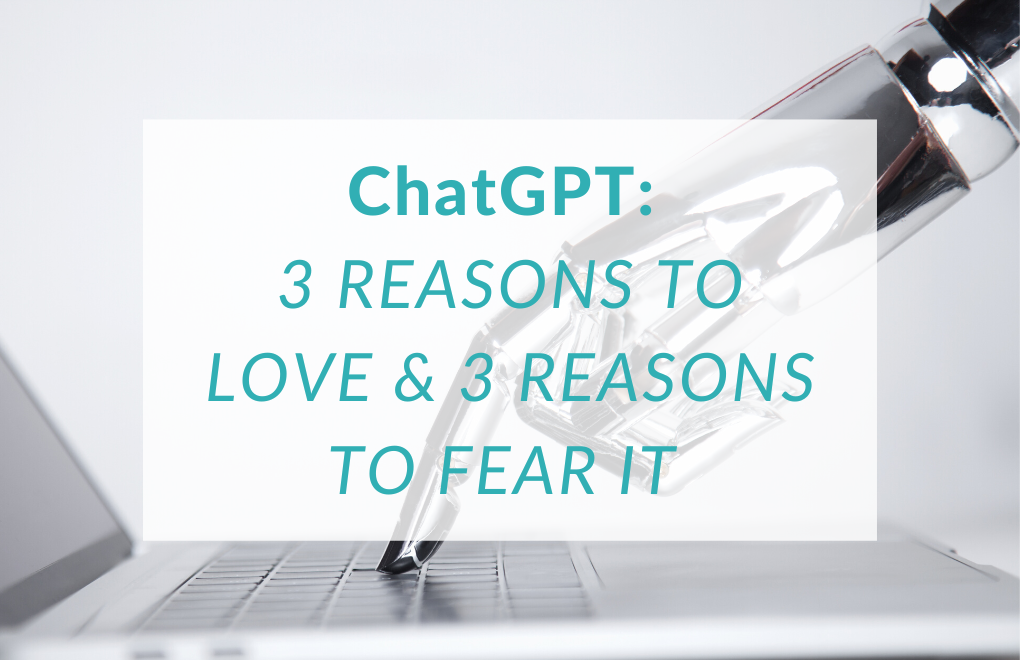I took ChatGPT out for a test ride. Can AI-enhanced writing save time-poor entrepreneurs and content marketers or is it going to ruin us all?
Can ChatGPT, the AI writing tool, be a hero that saves busy entrepreneurs and content marketers and helps them create high-quality content in no time?
Or is it the next five-minute-wonder we are going to forget in a few months?
As a copywriter who empowers entrepreneurs to write quality copy themselves, I was curious to find out what ChatGPT could do for me and my clients.
On one hand, I celebrate any tool that helps entrepreneurs get their content out there and spread the word about their amazing work – all while saving time.
On the other hand, the former journalist within me shakes her head and asks whether this can really be as good as it looks. Is there a catch, and if so, what is it?
There’s only one way to find out. I navigate to ChatGPT and strike off a conversation.
First Reason to #LoveChatGPT
Get an Article Outline in 10 Seconds
I start by typing:
“Could you help me structure an article on how entrepreneurs and content marketers can benefit from using ChatGPT?”
In 10 seconds, I’ve got a 5-part article structure in front of me, starting with an introduction and ending with a conclusion.
None of the ideas is exactly novel – I’m pretty sure I learned this same essay structure at school at the age of 13, Still, having a clear structure for your article is a sensible first step to take anyway, plus an efficient strategy to push through creative blocks, so this skeleton will help me get off to a good start.
This can be immensely helpful if you tend to procrastinate on your article for an hour before actually getting to work. Now you can procrastinate the 10 seconds it takes for ChatGPT to generate a response and then get right to work!
Second Reason to #LoveChatGPT
Optimise Your Content to Meet Demand
My next question dives deeper: “What would be some ways to use ChatGPT to generate fresh ideas?”
In an instant, I am delivered six suggestions, such as:
“Ask ChatGPT to generate a list of questions related to your industry or niche”
and
“Provide ChatGPT with a keyword or topic and ask it to generate a list of related keywords”.
Both are great suggestions when you want to make sure your article meets demand and is optimised for what people are actually looking for.
Again: time saved, frustration averted, better content in creation. So far so good.
Third Reason to #LoveChatGPT
Save Time for Other Business Priorities
I raise the challenge and ask: “Can you write me a 500-word article on how ChatGPT can help content marketers and entrepreneurs in creating quality content? I would like to cover 3 reasons to love ChatGPT and 3 reasons to be careful with its use.”
Then I list my main points below.
I tick on a timer, and the AI language model gets to work. 57 seconds later I receive this article.
Some of the wording is directly copied from my question, and none of the points goes very deep into what I wanted to cover, but still: it only took 57 seconds!
Using ChatGPT can save you a lot of time, and if you don’t love the act of writing itself, it can help you create content that is “good enough”. At the very least, you’ll get an evolved skeleton to prompt your own thinking.
First Reason to #FearChatGPT
Fact-Checking Is Not Included
I’m quite happy with what I’ve seen so far, but to create a balanced review, we need to look at the sombre side of things. The former journalist within me asks whether I can trust the information the tool is feeding me.
The tool is very honest about its potential shortcomings:
“It’s important to note that I do not fact-check the information I generate or provide. My responses are generated based on patterns and trends in the data I have been trained on, and I don’t have the ability to independently verify the accuracy of the information I provide.”
This means eager ChatGPT users can end up distributing misinformation by omission. The consequences of this depend highly on the industry and topics being covered.
For example, if I share bad content creation tips, the worst that can happen is maybe boring my audience or getting a few angry social media messages. However, specialised writers working in health care or in other highly regulated industries face far more devastating consequences if their facts aren’t correct.
Second Reason to #FearChatGPT
Sources Can Not Be Checked, Either
But let’s not get discouraged! As a trained reporter, I’m fully capable of checking the credibility of my sources myself. What are your sources, ChatGPT?
“As an AI language model, I don’t have a specific source of information for any given response. I generate responses based on patterns and trends in the data I have been trained on, which includes a wide range of sources, such as books, articles, and websites.”
I wonder how, back in my magazine editor days, my bosses would have responded, had I told them my article was based on “books, articles and websites”.
As there aren’t proper sources to mention, they cannot be checked, either. Looking at one article, this might not sound disastrous, but I end up asking myself how this might corrode our attitude towards truth, fact-checking and source critique over the long term.
Third Reason to #FearChatGPT
Creative Spark Is Missing
Don’t get me wrong, I enjoy conversing with ChatGPT. It feels fun and novel, but in 20 minutes, I grow bored.
The language of the tool is repetitive, and when the initial awe wears off, the responses become predictable. All the answers are structured the same way, and the creative spark is missing. I also miss the act of writing myself: the joy of coming up with a fresh metaphor (like this mental image of a sponge cake that resonated with people really well!)
After a few rounds of questions, I start gravitating towards other sources and the old-fashioned, time-consuming manual writing. I start playing with metaphors and structures.
What if, instead of the 5-step model ChatGPT suggested, I wrote this article as a story of my research?
That idea did not come up in our little AI chat.
Which Text Do You Like Better: The 57-Second-Version or the 57-Minute One?
In conclusion, ChatGPT and other AI-enhanced writing tools can be powerful and fast ways to get started and ensure your content meets its target, but there are serious questions to consider regarding the correctness of information and sources used.
While ChatGPT entertained me and helped me come up with the idea and some materials for this text, the final result you’re reading right now still includes many elements that are 100 percent me.
That is why I would love to hear from you: You now have access to both articles, my article which took roughly 57 minutes to create and the ChatGPT version which was cooked up in 57 seconds.
Which one do you prefer, and do you find the use of an additional 57 minutes justified?







Recent Comments